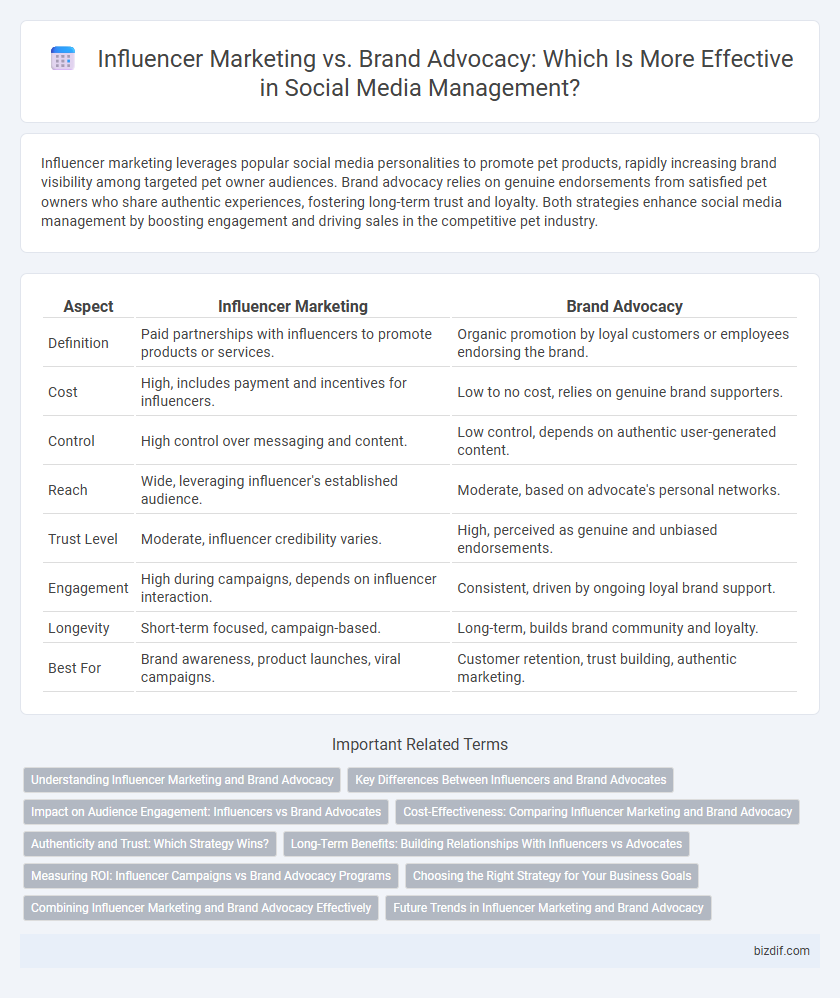Influencer marketing leverages popular social media personalities to promote pet products, rapidly increasing brand visibility among targeted pet owner audiences. Brand advocacy relies on genuine endorsements from satisfied pet owners who share authentic experiences, fostering long-term trust and loyalty. Both strategies enhance social media management by boosting engagement and driving sales in the competitive pet industry.
Table of Comparison
| Aspect | Influencer Marketing | Brand Advocacy |
|---|---|---|
| Definition | Paid partnerships with influencers to promote products or services. | Organic promotion by loyal customers or employees endorsing the brand. |
| Cost | High, includes payment and incentives for influencers. | Low to no cost, relies on genuine brand supporters. |
| Control | High control over messaging and content. | Low control, depends on authentic user-generated content. |
| Reach | Wide, leveraging influencer's established audience. | Moderate, based on advocate's personal networks. |
| Trust Level | Moderate, influencer credibility varies. | High, perceived as genuine and unbiased endorsements. |
| Engagement | High during campaigns, depends on influencer interaction. | Consistent, driven by ongoing loyal brand support. |
| Longevity | Short-term focused, campaign-based. | Long-term, builds brand community and loyalty. |
| Best For | Brand awareness, product launches, viral campaigns. | Customer retention, trust building, authentic marketing. |
Understanding Influencer Marketing and Brand Advocacy
Influencer marketing leverages individuals with large, engaged followings to promote products or services, driving brand awareness and purchase intent through sponsored content. Brand advocacy centers on cultivating loyal customers who voluntarily share positive experiences and recommend the brand authentically, generating organic trust and long-term engagement. Understanding the distinction helps businesses optimize social media strategies by balancing paid influencer campaigns with genuine brand ambassador programs.
Key Differences Between Influencers and Brand Advocates
Influencer marketing leverages individuals with large, engaged followings to promote products, focusing on reach and content creation for targeted campaigns. Brand advocates are genuine customers or employees who voluntarily endorse a brand based on personal experience and loyalty, emphasizing authenticity and trust. Key differences lie in the motivation, scope, and longevity of their promotional impact, with influencers often compensated and advocates driven by passion.
Impact on Audience Engagement: Influencers vs Brand Advocates
Influencer marketing drives rapid audience engagement through trusted voices with large, diverse followings, delivering high reach and immediate impact on brand visibility. Brand advocacy, built on genuine customer loyalty and authentic experiences, fosters deeper emotional connections and sustained engagement, often resulting in higher trust and long-term brand affinity. Combining influencer reach with brand advocate authenticity maximizes overall audience interaction and conversion rates.
Cost-Effectiveness: Comparing Influencer Marketing and Brand Advocacy
Influencer marketing often involves higher upfront costs due to negotiated fees for sponsored content and campaign deliverables, making it more suitable for short-term promotions with measurable ROI. Brand advocacy leverages loyal customers and employees who promote organically, resulting in lower expenses and fostering long-term cost-effective engagement. Analyzing cost-effectiveness reveals brand advocacy as a sustainable strategy with amplified authenticity, while influencer marketing delivers targeted reach at a premium.
Authenticity and Trust: Which Strategy Wins?
Influencer marketing leverages popular personalities to reach wide audiences but often faces skepticism due to perceived promotional motives, impacting authenticity. Brand advocacy relies on genuine customer or employee endorsements, fostering deeper trust through authentic, relatable experiences. Studies show brand advocacy campaigns generate 3x higher engagement rates and trust scores compared to traditional influencer marketing, making authenticity a critical factor in effective social media management.
Long-Term Benefits: Building Relationships With Influencers vs Advocates
Influencer marketing leverages popular social media personalities to reach broad audiences quickly, creating immediate brand awareness and potentially high engagement rates. Brand advocacy focuses on nurturing genuine relationships with loyal customers who naturally promote the brand over time, fostering deeper trust and sustained community growth. Long-term benefits favor brand advocacy as these advocates provide authentic endorsements that enhance credibility and create enduring customer loyalty.
Measuring ROI: Influencer Campaigns vs Brand Advocacy Programs
Measuring ROI in influencer marketing relies on metrics such as engagement rates, reach, click-through rates, and conversion tracking through affiliate links or promo codes. Brand advocacy programs focus on long-term customer loyalty, repeat purchase rates, and customer lifetime value (CLV) to evaluate the impact of organic endorsements. Tracking direct sales impact is easier in influencer campaigns, while brand advocacy requires analyzing sentiment, referral frequency, and brand sentiment shifts to gauge ROI effectively.
Choosing the Right Strategy for Your Business Goals
Influencer marketing leverages popular personalities with large followings to quickly boost brand visibility and reach targeted audiences through sponsored content. Brand advocacy relies on passionate customers and employees who genuinely endorse your products, fostering long-term trust and authentic engagement. Selecting the right strategy depends on whether your business prioritizes immediate exposure with controlled messaging or sustained credibility driven by organic support.
Combining Influencer Marketing and Brand Advocacy Effectively
Combining influencer marketing and brand advocacy enhances social media management by leveraging the reach of influencers and the trust of brand advocates, resulting in amplified brand awareness and authentic engagement. Influencer marketing taps into influencers' established audiences, while brand advocacy harnesses loyal customers' genuine recommendations, creating a powerful synergy for content credibility and conversion. Effective strategies include aligning influencer collaborations with brand advocate programs and encouraging user-generated content to maximize social proof and campaign impact.
Future Trends in Influencer Marketing and Brand Advocacy
Future trends in influencer marketing include increased use of AI-driven analytics to identify micro and nano-influencers with highly engaged, niche audiences, enhancing ROI and authenticity. Brand advocacy is evolving with businesses investing in employee advocacy programs, leveraging genuine internal voices to build trust and organic reach. The convergence of immersive technologies like AR and VR is expected to create novel, interactive brand experiences, blending influencer content with authentic brand advocacy to deepen consumer engagement.
Influencer marketing vs Brand advocacy Infographic

 bizdif.com
bizdif.com